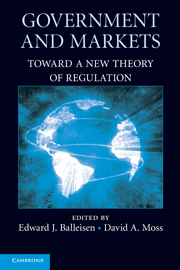Introduction
Published online by Cambridge University Press: 20 January 2010
Summary
After more than a generation of deregulation and a presidential declaration that the “era of big government is over,” the political pendulum has apparently begun to swing back toward regulation. Calls for effective government action, long subdued, have grown louder and more numerous. The provocations are not hard to find: the financial crisis first and foremost, but also accounting scandals at some of the nation's largest corporations (Enron, WorldCom, etc.); lead-tainted toys from China; E. coli outbreaks in the domestic food supply; collapsing levees and bridges; rising global temperatures and the threat of fundamental climate change.
One might expect that American lawmakers, confronted by these many challenges, could turn to experts in the academy for guidance. Yet to a surprisingly large extent, the academic discussion has remained stuck in a deregulatory mindset, more focused on government failure than on the ingredients of government effectiveness or success. As a result, there is a real danger that the new round of regulation will be rooted not in new research and new thinking, but rather in old ideas that are conveniently dusted off and reused in the absence of anything better.
This book represents an attempt by concerned academics to begin moving beyond old ideas about regulation – very old ones that informed earlier rounds of regulatory activity as well as more recent ones that drove a wave of deregulation beginning in the late 1970s.
- Type
- Chapter
- Information
- Government and MarketsToward a New Theory of Regulation, pp. 1 - 10Publisher: Cambridge University PressPrint publication year: 2009
- 3
- Cited by



